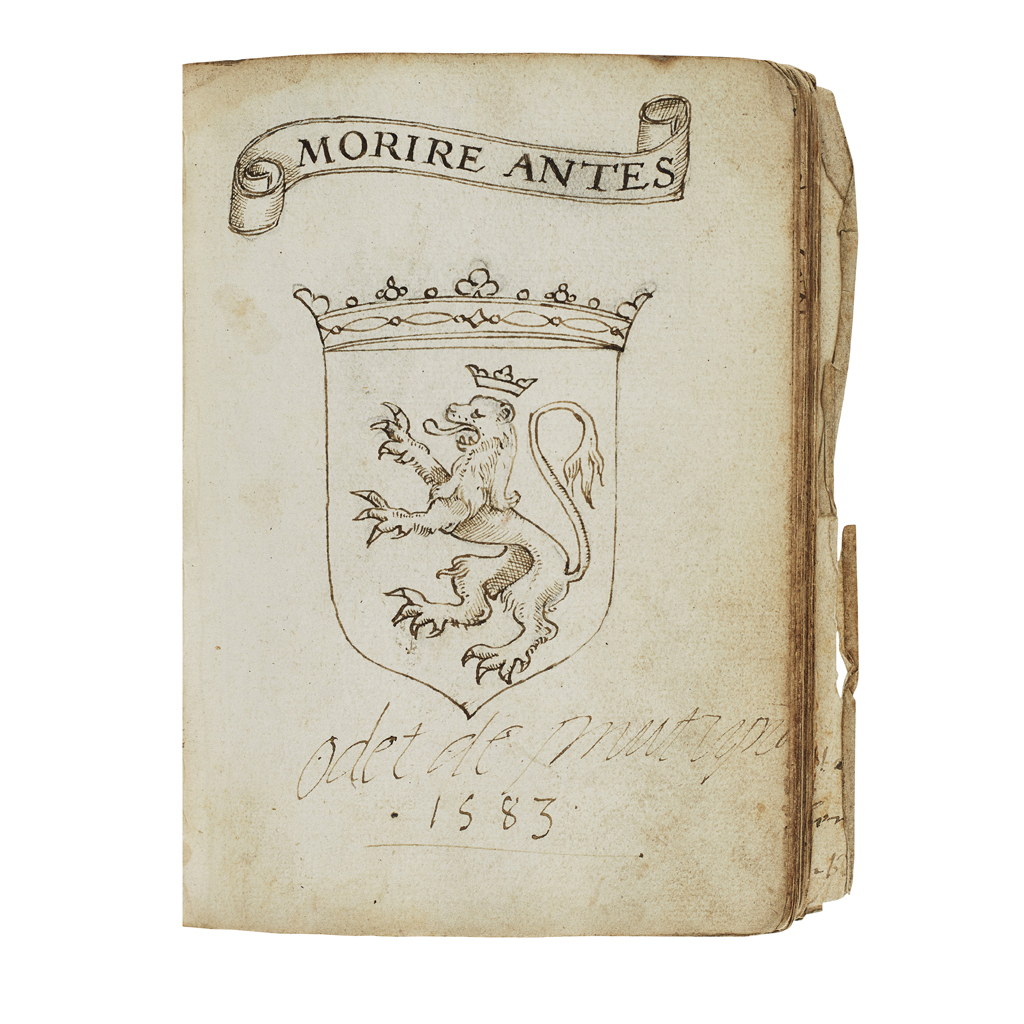Album Amicorum, 1581-1585
£7,750
Rare Books, Manuscripts, Maps & Photography
Auction: 11 October 2017 at 11:00 BST
Description
belonging to David Graham, 6th laird of Fintry (1557-1592), 78 manuscript leaves including 6 coats of arms (5 of which are coloured, and 2 are those of the Barons of Stubenberg), many contributors seem to be of Teutonic origin, such as Marcus, Christopher and James Fuggeri, Barons of Kirchberg (1581), with the majority of inscriptions in Latin, and occasionally French or English, other contributors include Charles de Balsa, 1581, with a small, hand-drawn coat-of arms and Wolfgang Comes à Montfort, 1581, among others, later vellum, 8vo sized, a little soiling to leaves throughout, some leaves and coats of arms loose
Footnote
Provenance: David Graham, 6th laird of Fintry. One inscription reads: "Marg. Graham, her book", suggesting that the book may have occasionally been used by later generations (Margaret Mackintosh, née Graham, was a granddaughter of David Graham); thence by direct descent within the Graham family.
Note: Literally a 'book of friends', the album amicorum was created by young travellers to record meetings with acquaintances. They often include heraldic shields, mottoes and inspirational quotations, written for the owner.
David Graham, 6th laird of Fintry, is notable for his role in the affair of the Spanish blanks. As a Roman Catholic, Graham formed part of a group of people who hoped to re-establish Catholicism in Scotland with the help of foreign armies. In 1576, he was only permitted to travel outside the country if David Lindsay and Thomas Fothringham of Powrie, "stood surety that he would do "nothing prejudicial in the realm during his absence" and "would not return without express licence."" However, during his travels, he consorted with supporters of Mary Queen of Scots, including the Archbishop of St Andrews, James Bethune, and finally returned to Scotland in 1583. William Bowes, English ambassador to Scotland, named Graham "the obstinate Papist young Fintrie..." [Mudie & Walker. Mains Castle & the Grahams of Fintry, 1964]
This Album Amicorum dates from the period of 1581, whilst Graham was on the continent, until around 1585, and the coats of arms and mottoes of foreign noblemen attest to David Graham's travels and the connections he formed. One page bears the slogan Initium Sapientiaw Timor Domini and states that the entry was written in Paris. Another inscription is signed Ingolstadt.
As the 1580s progressed, plans were formed for the King of Spain to invade England and Scotland, with the aim of re-establishing the Catholic faith. Mundie & Walker write: "After the defeat of the Spanish Armada in the summer of 1588, a fresh plan was devised for a Spanish landing in Scotland...The leader of this conspiracy...was Huntly, and Graham of Fintry was one of the Spaniards' principal contacts in Scotland."
For his part in the plot, Graham was banished to the continent, however he did not obey this order and continued his rebellion. This led to Graham's family seat, Mains Castle, being taken by the Constable of Dundee in 1589. Graham recovered the castle in 1590, but continued to conspire against the king, producing anti-Protestant propaganda, leading to the loss of his "movable property" and "all of the income" from his estates in 1591. Although the king gave Graham the opportunity to leave Scotland at this point, Graham declined.
Graham's downfall came in 1592, with the arrest of a George Ker, who was trying to leave the country. He was discovered with several incriminating letters addressed to the Duke of Parma and "eight papers, blank, except for the phrase "De vostre majestie tres humble et tres obesant serviteur and a signature..." An inquisition, accompanied by torture, showed that the blanks were to be filled up...to the effect that their signitories "should raise a power of horsemen and meet the Spanish armies at their landing...and convey them to England by all the forces they could procure upon the King of Spain's charges."" [Mudie & Walker, 1964]
One of the signatories, David Foster, was an alias of David Graham. Graham was arrested, tried and beheaded at the Mercat Cross in Edinburgh on 15th February 1593.

